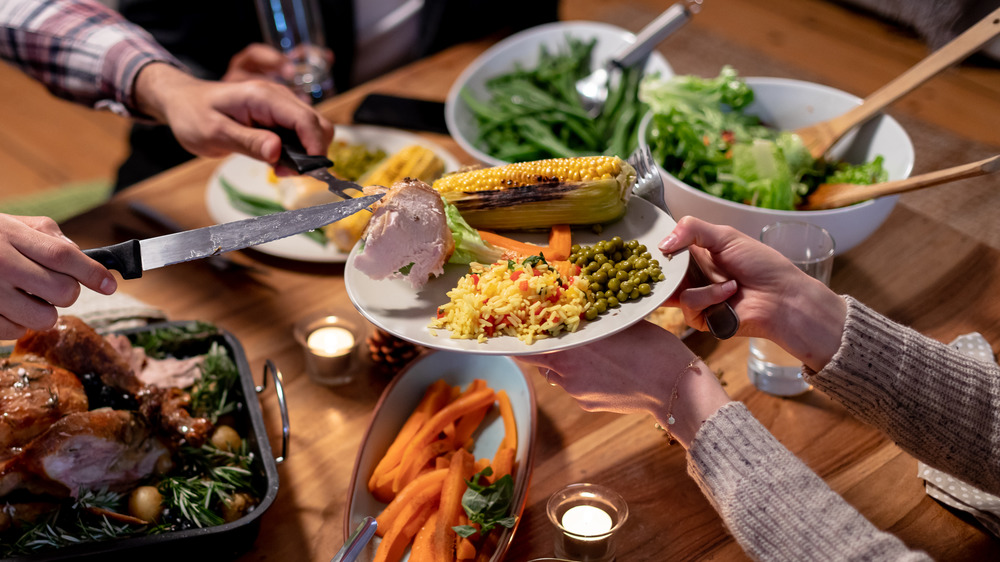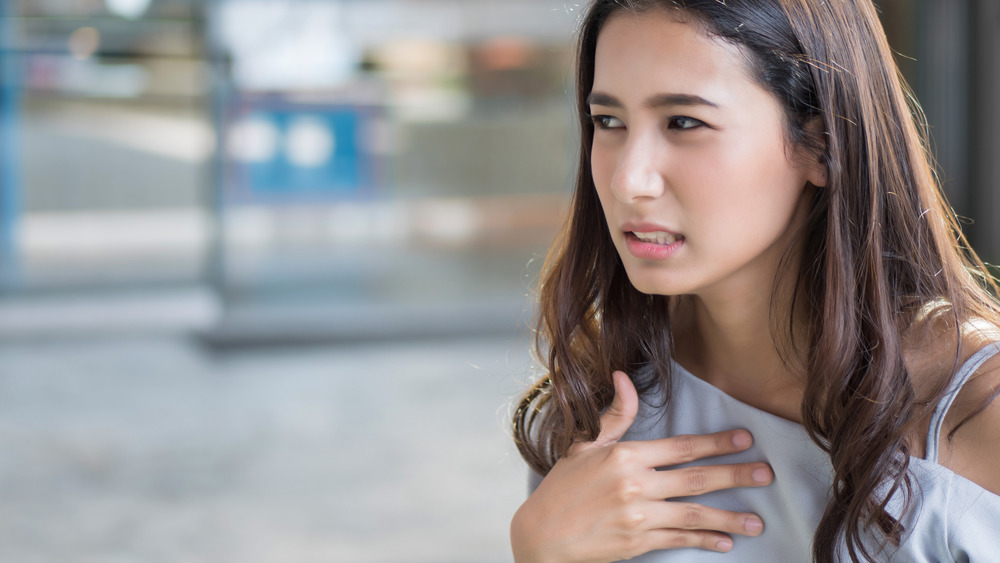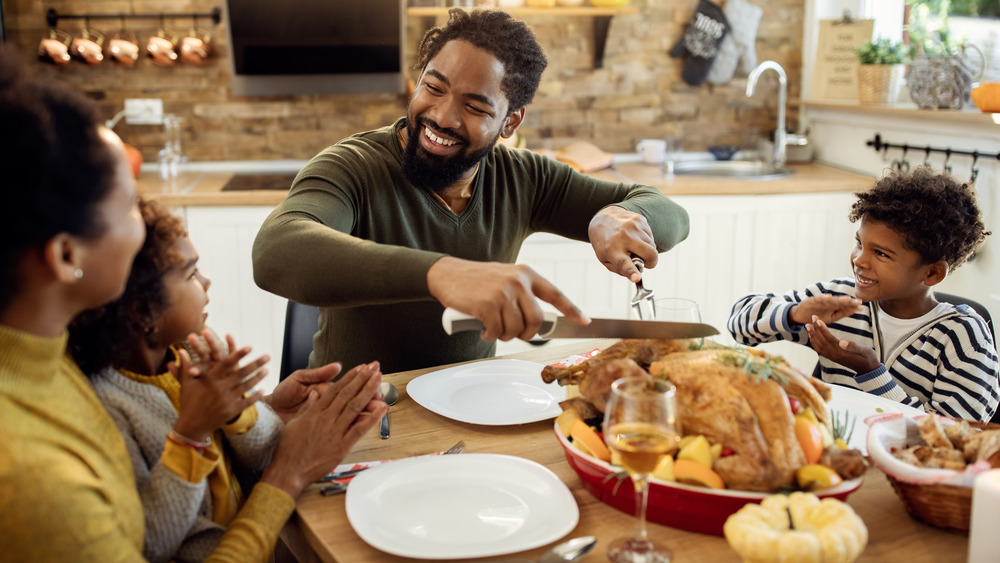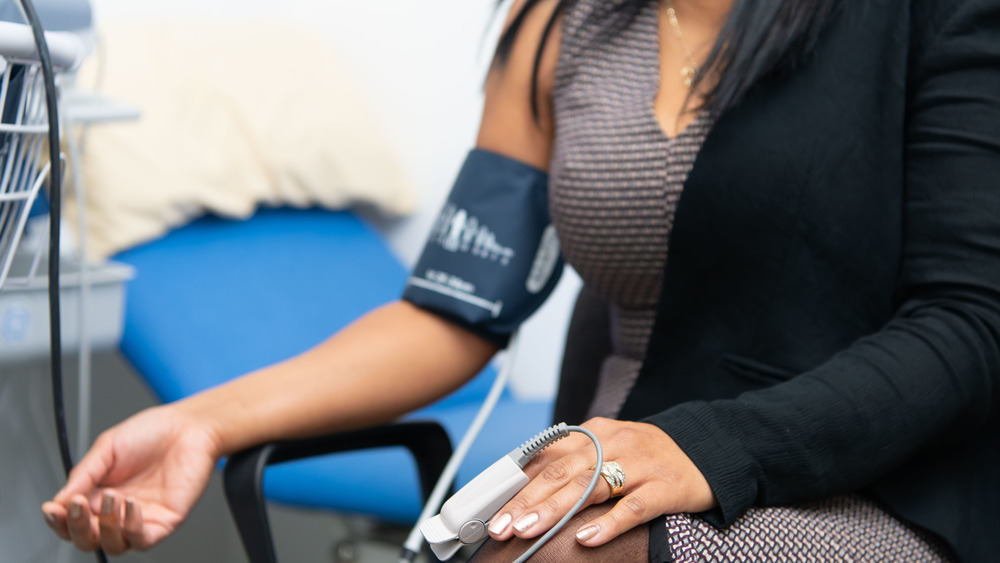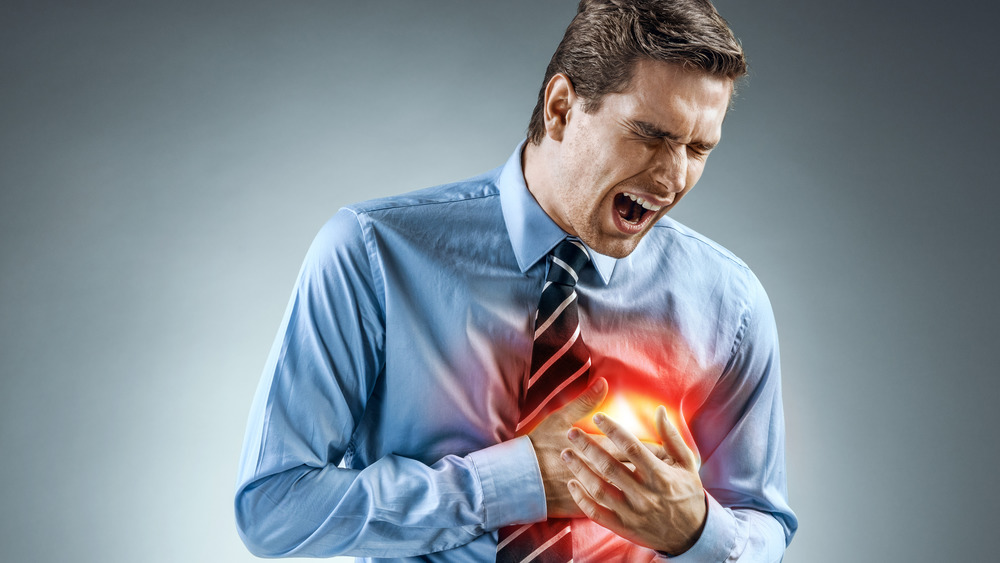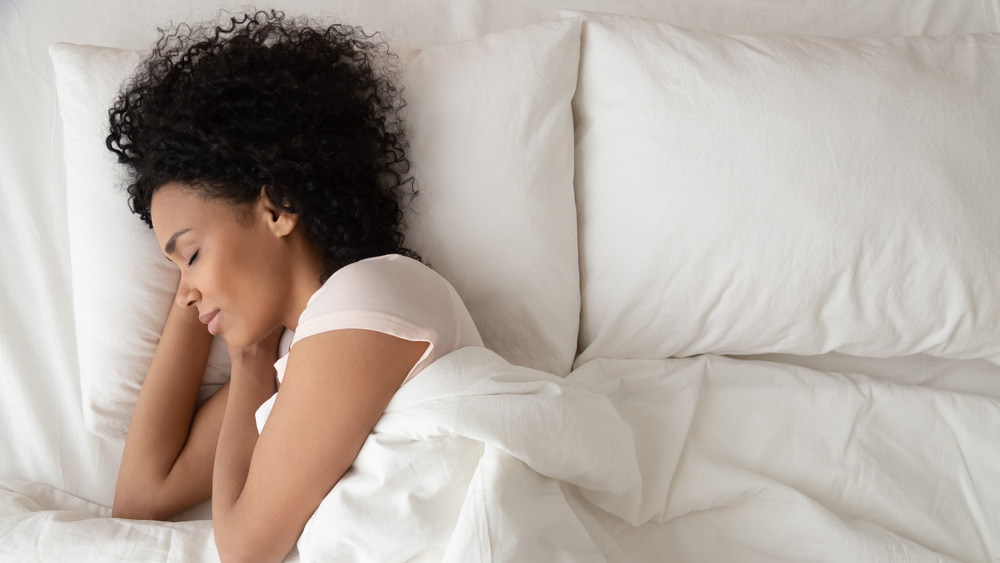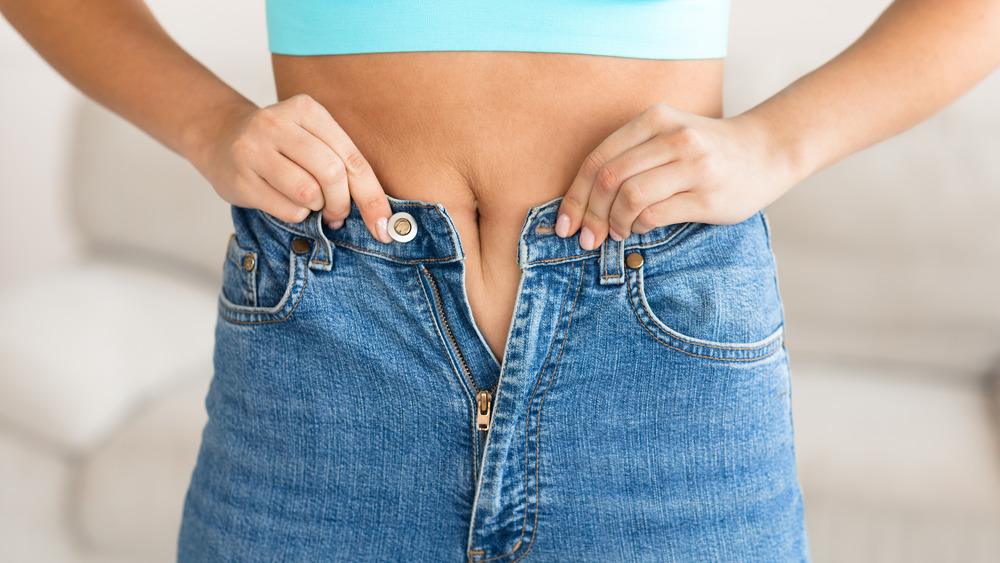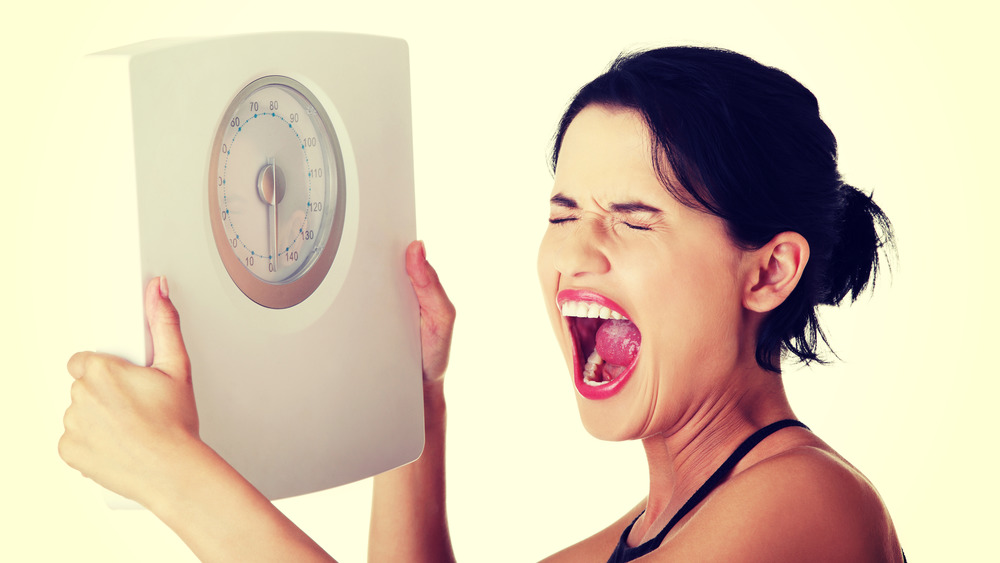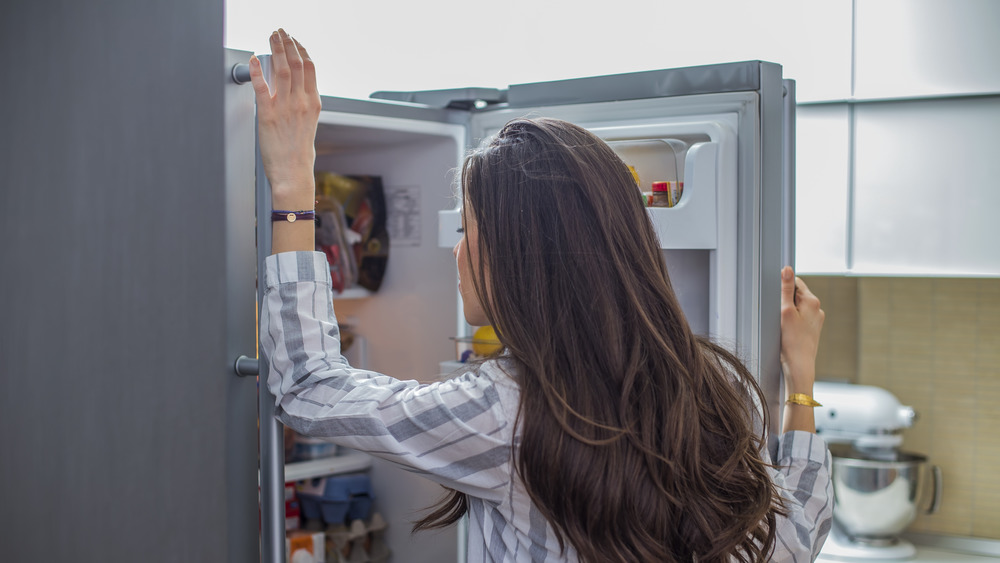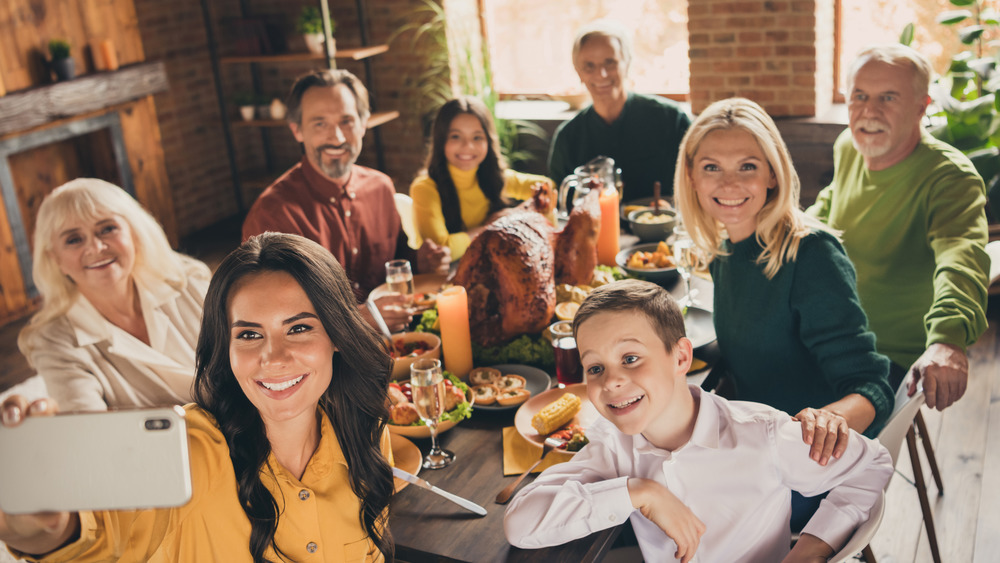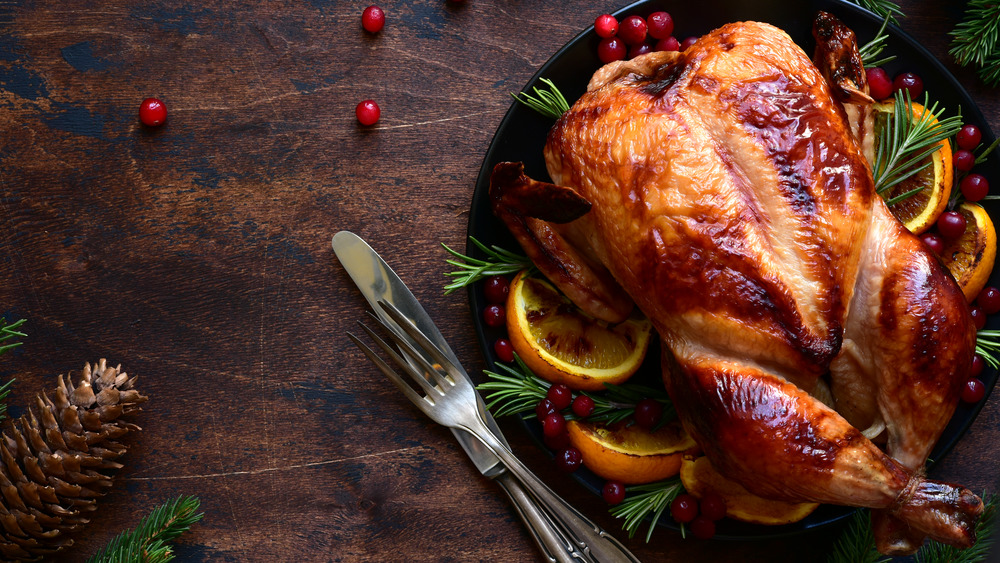Everything That Really Happens To Your Body On Thanksgiving
The tradition of the Thanksgiving feast dates back to the autumn of 1621, when newly arrived Pilgrims and Wampanoag Indians gathered at Plymouth to enjoy the bounty of their autumn harvest (via History). That first Thanksgiving feast featured deer and native fowl, perhaps turkey, quail, ducks, geese, or pigeon. It may also have included mussels, fish, nuts, corn, and herbs that the settlers had either grown themselves or foraged.
Sounds like a lot of food, right? It was, Kathleen Wall, culinarian at Plimoth Plantation, confirmed to National Geographic. Although Thanksgiving did not become an annual holiday until more than a century later, the tradition of gathering together and stuffing ourselves full of harvest-themed foods has been ongoing for the better part of the last four centuries.
Today, Americans are still prone to overeating on Thanksgiving, taking in, on average, 3,000 calories during the feast. Of course, this comes with an array of consequences. Let's take a look at everything that really happens to your body on Thanksgiving.
Your body produces a whole lot of gas on Thanksgiving
Foods that are typical of our modern-day Thanksgiving — turkey with stuffing, yams, green bean casserole, pumpkin pie, etc. — almost inevitably lead to at least some level of digestive gassiness, according to naturopathic medical doctor Sharon Stills. "Our Thanksgiving plate is typically filled with an abundance of different foods, many of which take a long time to digest. The result is a lot of digestive activity, which can lead to feelings of gassiness."
You might also feel gassy after a big Thanksgiving meal if you spend a lot of time chatting at the table, especially if you're spending an extended period of time at the table, which many people do on Thanksgiving, acupuncturist Dr. Tom Ingegno told Health Digest. The reason? Talking while eating can lead to swallowing air, according to the Mayo Clinic. The publication went on to state that some people swallow air as a nervous habit even when they're not eating or drinking. "Usually, swallowing air will cause burping, but sometimes, the air can make it into the lower GI tract and become flatulence," Dr. Ingegno explained.
You might experience heartburn after a big Thanksgiving dinner
Heartburn, a burning and often painful sensation just behind the breastbone, can occur after any big meal, according to the Mayo Clinic. Heartburn is caused by stomach acid backing up into the esophagus, which is the tube that carries food from your mouth to your stomach. Heartburn could happen on Thanksgiving because eating a meal that is more voluminous causes the stomach to distend, which puts pressure on the lower esophageal sphincter, whose job it is to keep stomach acids from moving up toward the mouth.
Heartburn can be made worse by adding alcoholic beverages into the mix or when you lie down after a big meal, registered dietitian Elisa Bremner told Health Digest, both of which are commonplace on Thanksgiving. "The best way to avoid heartburn is to stop eating before you get too full and limit foods known to cause heartburn, including, spicy foods, onions, citrus fruits, tomatoes, and alcoholic beverages."
Thanksgiving actually puts you at risk of bodily injury
"One of the more typical reasons for a trip to the emergency department on Thanksgiving Day ... is accidental cuts to the hands," according to Harvard Health Blog. So it pays to be slow and methodical while cooking and prepping the meal as well as while carving the Thanksgiving turkey. It also helps to keep distractions to a minimum.
The occurrence of burns to the skin also tends to spike on Thanksgiving, and kitchen fires double on Turkey Day, according to Harvard Health Blog, which recommends you "never leave the house with the oven on, and check on the turkey frequently." Furthermore, you should never deep fry a turkey indoors. You should also avoid deep frying a frozen turkey. This can lead to third-degree burns because frozen turkey can cause hot oil to spatter explosively. "If you're frying a turkey, always wear good footwear, practice fire safety, and monitor children in the area," the publication stated.
Your blood pressure could spike on Thanksgiving
One 2013 study published in the European Journal of Clinical Nutrition found that the holiday season (defined as Thanksgiving to New Year's Day) is associated with a significant increase in blood pressure — not to mention, body weight, body fat, and resting heart rate. The more a person weighs before the holidays, the greater the chance these numbers have of going up. One reason that blood pressure can spike as a result of a Thanksgiving meal, registered dietitian Elisa Bremner told Health Digest, is that many of our favorite Thanksgiving foods are often very salty (think: brined turkey and stuffing), which can raise blood pressure by impairing kidney function.
The American Heat Association advises limiting consumption of high-sodium foods as well as finding ways to manage stress and avoiding over-the-counter medicines that contain oxymetazoline, phenylephrine and pseudoephedrine, all of which can increase blood pressure. If you're in charge of cooking the Thanksgiving meal, Bremner recommends substituting herbs and spices for salt wherever possible.
Your risk of heart attack goes up on Thanksgiving
The winter holiday season, in general, is associated with an increase in heart attacks and heart attack-related deaths, according to a 2014 study published in the scientific journal, Circulation. The study observed an increase in cardiac-related deaths in hospitals starting around Thanksgiving, and a fall of such rates after New Year's Day. The study authors attributed this pattern not just to holiday overeating, which tends to begin with Thanksgiving and end on New Years Day, but also to emotional stress, lack of sleep, and excessive alcohol consumption, among other factors.
"Holidays and family can be major stressors for people to begin with. Add to that a Thanksgiving meal loaded with fat and sodium, the metabolism of which puts further stress on the body. All of that combines with the disruption of routine that goes along with holiday scheduling, creating further stress and making squeezing in a workout difficult. What you have is, unfortunately, a perfect storm scenario for a cardiac event," Dr. Tom Ingegno, a Baltimore-based acupuncturist, told Health Digest.
Your Thanksgiving meal could leave your body with an all-over sluggish feeling
Popular culture tends to blame the tryptophan in turkey for post-Thanksgiving-meal sluggishness. However, this is largely a myth."You might feel sluggish and tired after Thanksgiving dinner but it is probably not because of tryptophan," according to sports chiropractor Alex Tauberg. "While tryptophan at higher doses can potentially increase melatonin production and make you tired, there probably isn't enough in turkey for this, alone, to make you feel sleepy or even sluggish," Dr. Tauberg told Health Digest.
That being said, big meals — especially those featuring a lot of carbohydrates, like yams with marshmallows, stuffing, and pumpkin pie — can raise insulin levels, which can allow that pesky tryptophan to more easily enter the brain, according to Angus Stewart, senior lecturer in nutrition and dietetics at Edith Cowan University. In addition, registered dietitian Elisa Bremner pointed out to Health Digest that after a big meal, your body is so busy digesting larger-than-usual quantities of food, it has little energy left to devote to anything else.
Don't be surprised if you find yourself tossing and turning in bed on Thanksgiving night
As sluggish as a Thanksgiving meal can make you feel, it still might not lead to a good night's sleep. "Your body is supposed to rest and regenerate while you are sleeping. It can't do that if it's busy digesting a big meal," naturopathic medical doctor Sharon Stills told Health Digest. A 2016 review of studies published in Advances in Nutrition found that it's not actually an increase in carbs that prevent you from sleeping, but a high amount of fat.
The reasons are complex and touch on the nervous system, in addition to metabolism, but the simpler reasons include digestive distress, like gas, heartburn, and stomach distension, according to Dr. Stills. To help circumvent sleep disruption after your Thanksgiving dinner, Stills advises waiting at least three hours after eating before going to bed, which is how long it takes for the stomach to empty.
However, if you've consumed caffeine and alcohol, both of which are known to interfere with sleep, three hours may not be enough because the effects of these substances continue as they circulate in the blood.
Depending on how and what you eat, you may actually sleep better after Thanksgiving dinner
While overeating on a delicious Thanksgiving dinner can clearly lead to a night spent tossing and turning, your Thanksgiving meal doesn't have to mean waking up in the morning feeling like you never even slept. A healthy meal eaten in moderation can actually support a good night's sleep, according to Baltimore-based acupuncturist, Dr. Tom Ingegno, and even more so on Thanksgiving.
This is because the traditional feast features foods that can support a good night's sleep. Turkey contains tryptophan, which becomes available to the brain when eaten along with foods high in carbohydrates, such as stuffing and yams. Plus, carbs alone have been linked to better sleep. In addition, foods that are high in melatonin may lead to a more restful slumber. Such foods include cherries (cherry pie, anyone?), eggs, milk, fish, and nuts (pecan pie, yes!).
Your stomach will stretch to accommodate whatever you eat on Thanksgiving
Don't be surprised if you need to adjust your belt a notch or two looser right after, or even while you're still in the middle of, eating Thanksgiving dinner. That's because the human stomach has a natural ability to stretch, according to registered dietitian Elisa Bremner. In fact, the stomach can stretch to accommodate significantly more food than is actually healthy for us to consume. However, this stretching is not permanent (assuming you don't make a habit of eating Thanksgiving dinner every single night). Rather, your stomach goes back to its normal size when it's done digesting whatever was causing it to stretch.
Your clothes could even feel tighter the next day too — but not because of stomach distention. Bremner told Health Digest, that this is due to water retention. "In its effort to compensate for the salt in your food, your body will hold on to as much water as it can," she explained. Although it might seem counterintuitive, it's best to drink even more water, Bremner added, because this can hasten the process of flushing out the excess salt.
For many, Thanksgiving marks the beginning of holiday weight gain
Holiday weight gain is a common concern among adults. Multiple studies have shown that weight gain is so pervasive among adults during the holiday season (which begins with Thanksgiving), that even among adults who are already looking to lose weight or monitoring their food take, weight gain is a significant risk. There are many possible reasons, including an increase in food readily available, schedule disruptions that translate to skipped meals and skipped workouts, and emotional stress, which can lead to emotional eating.
While somewhat disheartening, this news isn't actually surprising to registered dietitian Elisa Bremner, who told Health Digest that weight-loss diets generally don't work in the long run without sensible and permanent healthy changes to our eating habits. However, you don't have to gain weight on Thanksgiving, nor does Thanksgiving have to be the catalyst for a season of weight gain, according to Bremner, as long as we plan ahead and enjoying our holiday meals using the same moderation that we would apply to any other meal.
You might find you're hungrier than usual the day after Thanksgiving
As if the indignity of having gone to sleep with a stomach full to the brim with stuffing and pie wasn't enough, what's with waking up the next morning craving chocolate chip pancakes with butter and maple syrup? The answer lies in how your body metabolizes simple carbs.
Simple carbs (breads, stuffing, cakes, pies, etc.) move from digestive tract to the bloodstream rapidly, which signals the pancreas to release insulin to metabolize all that excess blood sugar. In fact, insulin does its job so well that by the time you wake up the next day, your blood sugar levels are so low, you actually feel hungry again.
And if you wake up craving more of those simple carbs, it may be due to the happy, relaxed feelings that simple carbs give us, according to Harvard Health. Since simple carbs offer a "feedback effect" that can dampen negative emotions, we may find ourselves craving more as soon as our current levels diminish. Registered dietitian Ashley Koff told Prevention that these cravings will disappear within a few days just so long as we don't reinforce them by rewarding ourselves with more simple carbs.
You may not be in the mood for sex on Thanksgiving night
Thanksgiving is a food-centric holiday, offering many reasons for indulging in a multi-course, high-calorie meal featuring a large amount of carbs, fat, and protein. Good intentions aside, partaking in the traditional Thanksgiving meal can lead to feeling overly full, gassy, and bloated, which is going to have a tendency to take sex off the table, according to naturopathic medical doctor Sharon Stills.
Before rolling up your sleeves and indulging in what could be a libido-killing Thanksgiving dinner, a bit of a perspective shift could prove a game changer. "Consider that the day is, in fact, about gratitude," Dr. Stills told Health Digest. "But instead of making that gratitude about food, perhaps make it about your partner." Doing so "might actually put you in the mood for sex, which, if you think about it, is always something to be grateful about!"
You may risk getting or spreading coronavirus on Thanksgiving
Sadly, even small gatherings of people poses the risk of spreading coronavirus. "COVID-19 doesn't take holidays off," infectious disease specialist Natascha Tuznik told UC Davis's Newsroom. "Actually, we've seen cases spike after every major holiday since the coronavirus pandemic began."Dr. Tuznik added. The reason? "You get one person who's asymptomatic and infected, and then, all of a sudden, four or five people in that gathering are infected," leading infectious disease specialist Anthony Fauci said in an interview with Dr. Howard Bauchner of the Journal of the American Medical Association.
The stakes are higher when multiple generations gather together because coronavirus is known to be more dangerous in older people. Plus, younger people have been known to carry the virus without experiencing any symptoms. "Celebrating virtually or with the people you live with is the safest choice this Thanksgiving," the CDC revealed in November 2020.
Your body may just thank you after your Thanksgiving dinner
Let's not forget that the modern-day American Thanksgiving meal includes good sources of low-fat protein, vitamins, and antioxidants. Turkey is high in protein and sweet potatoes are rich in vitamins A, B6, and C, as well as potassium and fiber. And don't forget cranberries or cranberry sauce, which is good for the urinary tract and can help prevent cancer.
"A 5oz glass of wine is packed with the antioxidant reservatrol, which reduces bad cholesterol and prevents blood clots," according to the Chrysalis Center for Counseling and Eating Disorder Treatment. Even pumpkin pie has a place at the healthy Thanksgiving table because it's full of fiber and potassium, which "helps counteract the high levels of sodium in a traditional Thanksgiving meal."
The key to deriving the most benefits and the fewest consequences from Thanksgiving is exercising moderation in all your choices — from whom you choose to spend the holiday with and what foods you plan to eat to how much you end up eating and how much time you give yourself to digest your food before bed.

